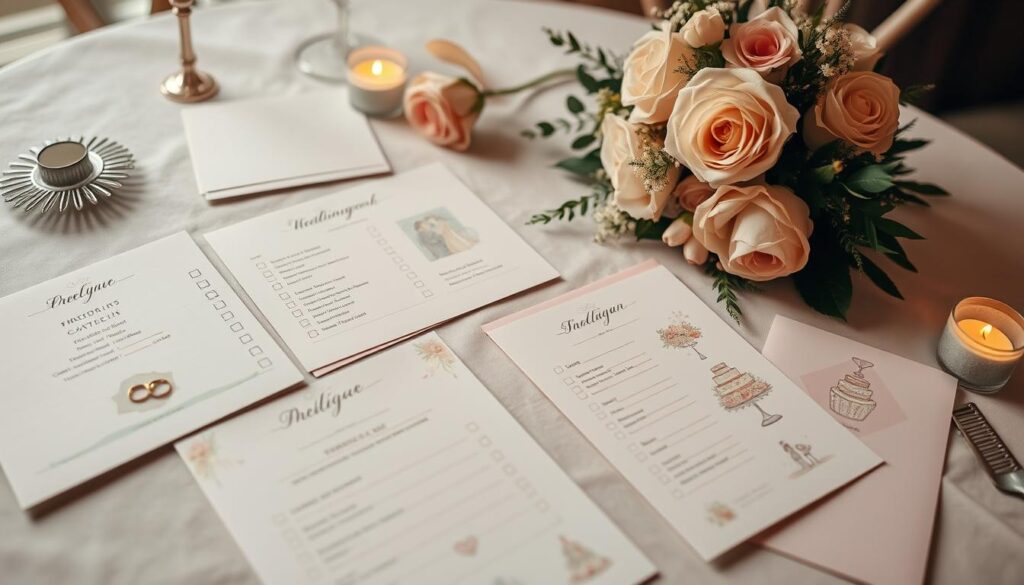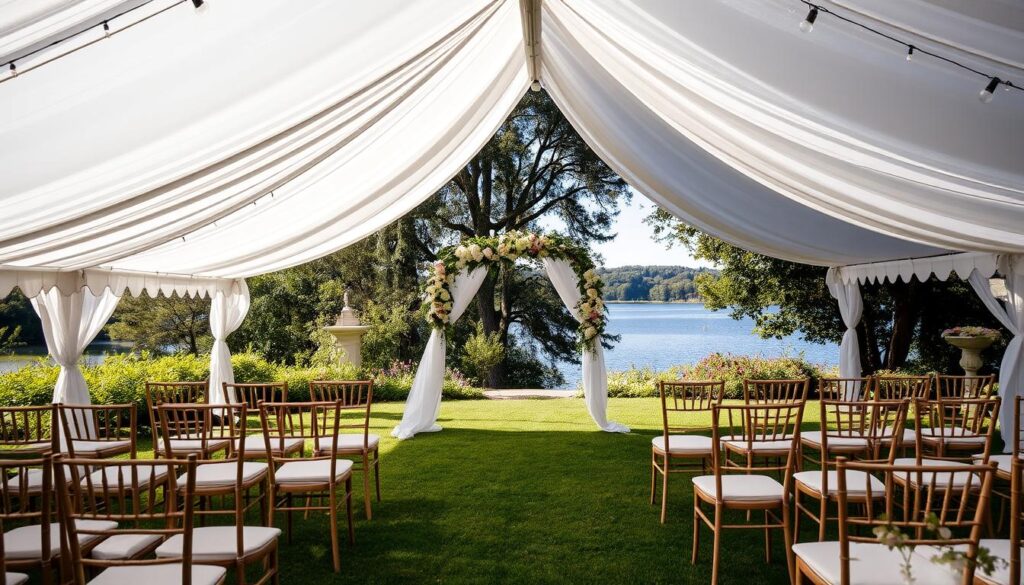תכנון החתונה שלך הוא מסע מרגש עם המון בחירות ורגשות. כדי להפוך את החלום שלך למציאות, חשוב לקבל טיפים מעולים לתכנון חתונה. מאמר זה יעזור לך לשלוט בשלבים המרכזיים לעיצוב החתונה המושלמת שלך. נדבר על מציאת החזון שלך, ניהול התקציב, בחירת המקום הטוב ביותר ובחירת הספקים הנכונים. השלבים הללו יגרמו ליום הגדול שלך להיות בלתי נשכח.
מסקנות מרכזיות
- הגדר את סגנון החתונה והחזון שלך בשלב מוקדם.
- צור רשימת משימות מקיפה להכנות ליום החתונה.
- קבע תקציב המתאים לכל ההוצאות של החתונה שלך.
- בחר מקום שישפר את חוויית החתונה שלך.
- נהל את רשימת האורחים שלך ביעילות כדי להקל על תהליך ההזמנות.
- חקור ושכור ספקים אמינים כדי להבטיח את השירותים הטובים ביותר.
- פתח ציר זמן מפורט כדי לשמור על יום החתונה שלך במסלול.
הבנת החזון שלך
התחלת תכנון החתונה שלך מתחילה עם הבנת החזון שלך. זהו היסוד לכל התכנון. זהו מבטיח שהיום מציג מי אתה והשותפ/ה שלך.
הגדרת סגנון חתונת החלומות שלך
יצירת סגנון חתונה מאוחד היא מרכזית. זה יוצר אווירה שמרגישה נכונה עבור שניכם. מדריך סגנון חתונה מפורט משמש כמפה. זה מנחה אותך בבחירות כמו עיצוב כפרי, מודרני או רומנטי. תשמור על אלה בדעתך בעת יצירת הסגנון שלך:
- פלטת צבעים: בחר צבעים שיוצרים את התחושה הנכונה ומציגים מי אתה.
- אלמנטים לעיצוב: השתמש בפרחים, אורות ורהיטים שמתאימים היטב לערכת הנושא שלך.
- לבוש: בחר בהלבשה שמתאימה לחזון שלך ולסגנון האישי שלך.
דיון בציפיות עם השותף שלך
לדבר על מה שאתם שניכם מצפים הוא חיוני. זה יוצר תהליך תכנון משותף יותר. זוגות צריכים לשתף את המשאלות, הדאגות והצרכים שלהם באופן פתוח. בכך אתם מבינים זה את זה ויכולים להציב מטרות חתונה ברורות. דברו על:
- שקלולי תקציב: הסכימו על התקציב שלכם והחליטו מה חשוב ביותר.
- מגבלות ברשימת האורחים: דברו על מספר האורחים שתרצו להזמין.
- ערכים אישיים: ציינו אילו מסורות ברצונכם לשמור עליהן או לדלג עליהן.
טיפים לתכנון חתונה
תכנון חתונה אפקטיבי מתחיל עם תוכנית מפורטת. הצעד הראשון הוא ליצור רשימת משימות מפורטת. רשימה זו תשמור עליכם מאורגנים ותוודא שלא תשכחו דבר חשוב. על ידי פיצול המשימות, התכנון מרגיש פשוט ופחות מעורר חרדה. בכך, זוגות יכולים בקלות להתמקד ולשמור על הדברים במסלול.
יצירת רשימת משימות מקיפה
ראשית, כתבו את כל הדברים החשובים לחתונה שלכם, כמו בחירת מקום, הזמנת ספקים והכנת רשימת אורחים. פיצולם לחלקים קטנים יעזור לראות את התמונה הכוללת. ניתן להשתמש בקטגוריות שונות כדי לארגן את הרשימה שלכם:
- מקום ותאריך
- קייטרינג ותפריט
- רשימת האורחים והזמנות
- צילום וצילום וידאו
- הלבשה ואביזרים
- עיצוב ופרחים
- בידור
ודאו לבדוק ולעדכן את רשימת המשימות שלכם בתדירות. זה יעזור להתאים תוכניות כשצריך, ויתן לכם שקט נפש בעת התכנון.
הגדרת עדיפויות ליום הגדול שלכם
החלטה על חלקי החתונה שחשובים ביותר היא מרכזית. כל זוג שונה. ישנם שיהיו יותר חשובים להם המקום, בעוד אחרים יעדיפו בידור או תמונות. לדבר על הבחירות הללו יעזור לכם להבין מה חשוב לשניכם.
כדי לעזור לארגן, חשבו על יצירת טבלה למיון את עדיפויות החתונה שלכם:
| אלמנט חתונה | רמת עדיפות | הקצאת תקציב |
|---|---|---|
| מקום | גבוהה | 40% |
| קייטרינג | גבוהה | 30% |
| צילום | בינונית | 15% |
| בידור | בינונית | 10% |
| פרחים | נמוכה | 5% |
מערכת זו מבטיחה שתוציאו את התקציב שלכם על פי מה שחשוב ביותר. היא עוזרת ליצור יום שמשקף באמת את האישיות וההעדפות שלכם.

בחירת המקום המושלם
למצוא את המקום הנכון הוא מרכזי לתכנון החתונה שלכם. זה קובע את אווירת האירוע ומשפיע על בחירות אחרות כמו ערכת נושא וקייטרינג. כאשר בוחרים מקום, זוגות צריכים לשקול דברים רבים.
גורמים לשיקול כאשר בוחרים מקום
זוגות יכולים להתבונן במספר גורמים חשובים בעת בחירה:
- מיקום: ודאו שהמקום קל להגעה של האורחים.
- קיבולת: בחרו מקום שמתאים לכל האורחים שלכם בנוחות.
- אווירה: חשבו על מראה ותחושת המקום כדי להתאים לסגנון החתונה שלכם.
שירותים זמינים: בדקו האם הם מציעים שירותי קייטרינג, עיצוב ועזרה בתכנון כדי לפשט את היום שלכם.
הבנת עלויות וחבילות האירוע
לדעת על עלויות האולם עוזר לכם לתקצר תקציב. לאולמות יש חבילות שונות שמתאימות לצרכים שונים:
| סוג המקום | תכונות החבילה | עלויות ממוצעות |
|---|---|---|
| מלון | אירוח, שירותי קייטרינג ועיצוב | $10,000 – $25,000 |
| אולם בנייני | שירות מלא כולל התקנה וניקיון | $5,000 – $15,000 |
| גינה חיצונית | מרחב אירועים, עיצוב בסיסי ותיאום | $3,000 – $12,000 |
| מקום יעד | אירוח ופעילויות לסופ"ש | $15,000 – $50,000 |
שימו לב לעמלים נוספים ועלויות נסתרות בנוסף לחבילות. ככל שתדעו יותר על העלויות והאפשרויות, תהיה קל יותר לבחור מקום בתוך התקציב והסגנון שלכם.

הקמת התקציב שלכם
להקמת תקציב טוב היא מרכזית לשמירה על עלויות החתונה שלכם במסגרת. זה גם מבטיח יום מיוחד שתזכרו לעד. למידה על עלויות חתונה נפוצות עוזרת לכם לתכנן את ההוצאות שלכם בצורה טובה יותר.
יסודות התקציב להוצאות חתונה
עלויות החתונה יכולות להתצפצף מהר, לכן חשוב לדעת לאן הכסף שלכם עשוי להילך. תחומים מרכזיים להוצאות כוללים:
- השכרת מקום
- שירותי הסעדה
- הלבשת הכלה
- קישוטים
החזקת תקציב גמישה היא חכמה מאחר שהיא מאפשרת לכם להתמודד עם הפתעות. זה טיפ מוביל לתכנון חתונה. לשים כסף במקומות שחשובים לכם עוזר לשמור על חלום החתונה שלכם בחיים.
טיפים לחיסכון ביום החתונה שלך
ישנם דרכים רבות לחסוך כסף ועדיין לקבל את החתונה שאתה חולם עליה. הנה כמה טיפים חכמים לחיסכון:
- בחר תאריכי חתונה בשעות פחות פופולריות כדי להפחית עלויות מקום.
- עשה פרויקטים בעצמך לעיצובים אישיים ומתנות.
- משאילו עם ספקים על מנת לקבל מחירים טובים יותר או עסקאות מארז.
על ידי שימוש בשיטות אלו, תוכל לשלוט בתקציב החתונה שלך בצורה יותר טובה. הכל נעשה על ידי בחירות חכמות כדי לקבל יום בלתי נשכח מבלי להוציא יתר.

יצירת רשימת האורחים שלך
בעת תכנון רשימת האורחים שלך, כמה גורמים מרכזיים. מספר האורחים משפיע על התקציב שלך ועל בחירת המקום. לדעת מי אתה רוצה שיהיה שם היא חשובה לאירוע נהדר.
קביעת מספר האורחים שלך
התחל עם רשימה מלאה של אנשים שתרצה להזמין. סדר אותם לקבוצות כמו משפחה, חברים ועמיתים. הבנת הקשרים הללו עוזרת לך להבין כמה אנשים תוכל להזמין. וודא שהמקום מתאים לכולם בנוחות. תאם את הרשימה שלך כפי שנדרש כדי לשמור על חזון החתונה שלך.
ניהול הזמנות ותשובות RSVP
ניהול הזמנות דורש בחירה בין פורמטים דיגיטליים ומסורתיים. ההחלטה שלך צריכה לשקף את נושא החתונה ואת הטעם שלך. הזמנות דיגיטליות הן ידידותיות לסביבה; המסורתיות מציעות מגע נוסטלגי.
בין לבין, עקוב אחרי התשובות בקרוב. שימוש בגיליון אלקטרוני עוזר לשמור על תגובות, בחירות בארוחה ופרטים נוספים. השיטה הזו מפשיטה את תקשורת האורחים, ומפחיתה מתחים.
| סוג הזמנה | יתרונות | חסרונות |
|---|---|---|
| הזמנות דיגיטליות | עלות נמוכה, ידידותיות לסביבה, משלוח מהיר | פחות רשמי, ייתכן שיגיעו לתיקי דואר זבל |
| הזמנות פיזיות | מסורתי ורשמי יותר, חפצי זיכרון מוחשיים | עלות גבוהה, זמן משלוח ארוך יותר |
שכירת צוות הספקים של החלומות שלך
הפיכת החלום שלך לחגיגת נישואין ממשית משמע לבחירת הספקים הנכונים. תצטרך צלמים, מסעדנים, ועוד. כל אחד מהם מפתחי ליום נישואין חלק. חשוב לחקור ולדבר איתם כדי לבנות צוות טוב.
חקירה וראיון עם ספקים
התחל לחפש מקצוענים בתחום הנישואין שאתה יכול לסמוך עליהם על ידי שאלת אנשים שאתה מכיר ובדיקה ברשת. במהלך החקירה, זכור ל:
- בדוק תיקי עבודות ברשת כדי להעריך איכות וסגנון.
- קבע פגישות כדי להעריך אישיות ותאימות.
- שאל על ניסיון קודם והמלצות מלקוחות.
מציאת ספקים שמבינים את החזון שלך חיונית. אל תשכח לבדוק אם הם פנויים וגמישים ליום שלך.
הבנת חוזים והסכמים
לאחר בחירת הספקים שלך, חשוב לבדוק את החוזים בקפידה. המסמכים הללו מכילים את כל פרטי ההסכם. וודא שאתה מבין:
- הבהרת עלויות ולוחות תשלומים.
- מדיניות ביטולים ופרטי החזר כספי.
- שירותים ספציפיים הכלולים בחוזה.
עיון קפדני בחוזים מונע בעיות ושומר על ענייניך. שיחות ברורות על מה שאתה רוצה עושות את זה קל יותר.
יצירת גרף זמן ליום החתונה שלך
גרף זמן ברור ליום החתונה שלך עוזר להכל לרוץ בצורה חלקה. הכל נעשה על מנת לתת מספיק זמן לרגעים חשובים כמו הטקס והקבלה. תחילה, החלט על האירועים העיקריים שברצונך לכלול ביום שלך.
כאשר אתה מקבע את תוכנית החתונה שלך, חשוב לחשוב על:
- זמני התחלה וסיום לכל חלק
- צרכי צלם וצלמת
- זמן לעיצוב שיער ואיפור
- הסדרי הסעה
- זמן להגעת האורחים
עבוד ביחד עם ספקי החתונה שלך כדי ליצור גרף זמן טוב. שוחח עם הצלם שלך, הקייטרינג והכהן כדי לשמור על כולם בעניין. בכך תוכל להתמודד בצורה חלקה עם כל השהיות שעלולות לצוץ.
כאן דוגמה ל-ציר זמן ליום החתונה:
| זמן | אירוע | משך |
|---|---|---|
| 11:00 בבוקר | תסרוקת ואיפור | 3 שעות |
| 2:00 אחה"צ | נסיעה לאולם | 30 דקות |
| 2:30 אחה"צ | החתונה מתחילה | 30 דקות |
| 3:00 אחה"צ | שעת קוקטייל | 1 שעה |
| 4:00 אחה"צ | הקבלה מתחילה | 4 שעות |
| 8:00 אחה"צ | הקבלה נגמרת | לא רלוונטי |
הפוך את ציר הזמן של החתונה שלך לאישי ושקול את כל המעורבים. התכוננו לכל דבר בלתי צפוי. הכי חשוב, תהנו מכל רגע ביום הגדול שלכם.
מסקנה
להתחיל את המסע של תכנון החתונה הוא מרגש. וודאו שיש לכם תוכנית ברורה ליום הגדול שלכם. חשוב לחשוב על סגנון החתונה שלכם, לדבר בפתוחות עם השותף שלכם, ולציין רשימת משימות מפורטת. לעבור על נקודות אלו בעת הסיום של תכנוניכם יסייע לשמור על ראיית המטרה שלכם.
במהלך התכנון שלכם, התמקדו בנושאים חשובים כמו קביעת תקציב, בחירת המקום הטוב ביותר, ומציאת הספקים הנכונים. על ידי החילול של טיפים אלו והיות מוכנים להתאים, תוכלו להפחית דחף ולהפוך את התכנון לחוויה נעימה יותר. כמו כן, שמרו על רשימת טיפים לחתונה שתעזור לכם להישאר מאורגנים ומוטיבים.
המסע של תכנון החתונה חשוב כמו היום של החתונה עצמו. תמשיכו לשמור על הזמן הזה, תהנו מכל שלב, ודעו שהעבודה הקשה שלכם תוביל לחגיגה נפלאה. החגיגה הזו תציג את אהבתכם והתמיכה שלכם בצורה יפה.
